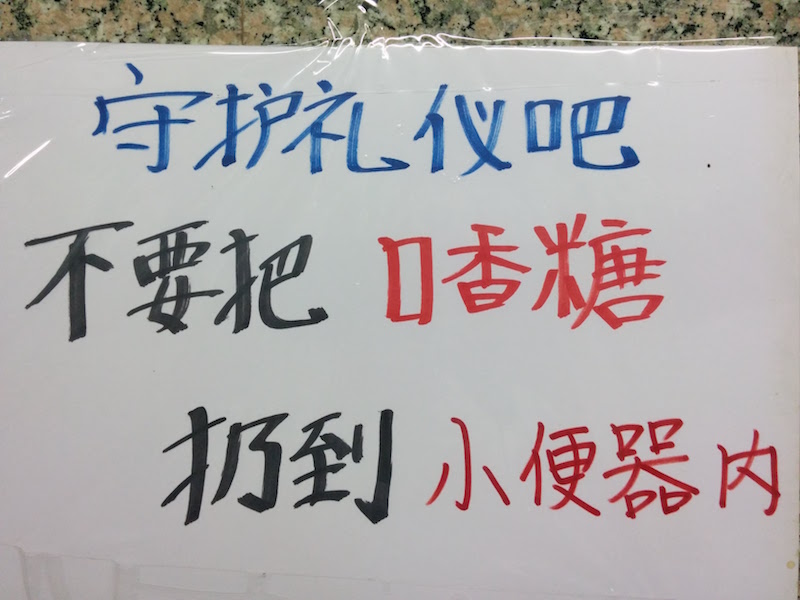Archive for Style and register
September 15, 2016 @ 12:34 pm· Filed by Geoffrey K. Pullum under Prescriptivist poppycock, singular "they", Style and register, Syntax, Writing
The following sentence can be found (as of 15 September 2016) in this Wikipedia article about the effects of rape on the victim:
Sometimes in an effort to shield oneself from believing such a thing could happen to their loved one, a supporter will make excuses for why the event occurred.
The clash in pronoun choice (the switch from one to their) makes this clearly anomalous. What exactly could have led to its being written? I think at least two unease-promoting factors are involved.
Read the rest of this entry »
Permalink
June 29, 2016 @ 3:06 am· Filed by Geoffrey K. Pullum under Prescriptivist poppycock, Style and register, Usage
Says Bagehot, the pseudonym-cloaked correspondent of The Economist who writes a page of comment on British affairs every week (25 June 2016, p. 27 in Brexit-delayed UK edition; not present in the US edition dated June 25):
As early as January a top Brexiteer freely admitted to Bagehot that his campaign planned to turn the public against its leaders; it wanted systematically to delegitimise Britain's pro-EU political, bureaucratic and business elites.
Is that the first time you've heard anyone talking about systematic wanting? It's a first for me. But of course The Economist is just sticking to its dreadful policy of syntactic self-harm, by mechanically moving adverbs to the left so that they don't follow to in an infinitival complement.
Read the rest of this entry »
Permalink
June 14, 2016 @ 9:58 am· Filed by Geoffrey K. Pullum under Ignorance of linguistics, Language and the media, Prescriptivist poppycock, Psycholinguistics, Style and register, Syntax, Usage advice
Mark Liberman's discussion of an absurd modifier placement rule in the Associated Press Style Book reminded me of an ancient and not particularly funny joke that, the way I first heard it, is based on an offensive stereotype of gay men. I was going to explain on the Chronicle of Higher Education's language blog Lingua Franca a couple of months ago, but to my surprise I was forbidden to do so. The Chronicle lives in abject terror of offending gays or blacks or women or Asians or prudes or any other identifiable section of its readership that might take offense at something (and they may be right to be afraid: this week I was accused of ageism by a commenter for using the phrase "between 60 and 70 years old" as part of a description of an imaginary person). I'll tell you here on Language Log what I was going to say, and you can decide.
Read the rest of this entry »
Permalink
June 14, 2016 @ 7:24 am· Filed by Victor Mair under Phonetics and phonology, Style and register, Writing systems
Flying back from Vienna on Austrian Airlines yesterday, I saw the following notices printed on the back of the seat in front of me:
Gurte während des sitzens geschlossen halten*
Fasten seat belt while seated
—
*some airlines begin this sentence with a "bitte", which would make the German even longer
Die schwimmweste befindet sich unter ihrem sitz
Life vest under your seat
Read the rest of this entry »
Permalink
June 10, 2016 @ 12:58 pm· Filed by Geoffrey K. Pullum under Gender, Humor, Idioms, Jargon, Language and culture, Language and gender, Language and medicine, Metaphors, Names, Neologisms, Orality, Semantics, Silliness, Slang, Style and register, Swear words, Taboo vocabulary, Words words words
British comedian Richard Herring is the author of a 2003 book entitled Talking Cock: A Celebration of Man and his Manhood, so he naturally seized upon the republicization opportunity provided by the recent story of the world's first successful penis transplant. He made it the topic of his weekly humor column in The Metro, the trashy free newspaper that I sometimes reluctantly peruse in my constant search for linguistic developments that might be of interest to Language Log readers.
In a bravura display of diversity of lexical choice, Herring contrived to use a different euphemism for the anatomical organ every time he could find an excuse for mentioning it, which, believe me, was a lot. And he left me pondering a serious lexicographical question: just how many euphemisms are there for the appendage in question?
[Unusually, this post is restricted to adult males. Please click "Read the rest of this entry" to confirm that you are male and over 18.]
Read the rest of this entry »
Permalink
June 3, 2016 @ 10:55 pm· Filed by Victor Mair under Rhetoric, Style and register
Emily Rauhala has an entertaining, enlightening article about a startlingly improbable new kind of PRC officialese:
"‘Ever been to Tibet bro?’ A nationalistic Chinese Twitter account goes rogue" (WP, 6/1/16)
The article is so well written that I wouldn't want to try to steal Rauhala's thunder, so I will just quote the first part, and encourage you to read the rest, including clicking on the embedded links, some of which are hilarious (bear in mind that the funniest links go directly to official Chinese government posts).
Read the rest of this entry »
Permalink
June 3, 2016 @ 11:04 am· Filed by Mark Liberman under Style and register
In "The shape of things to come" (5/13/2016) and "Trump the Thing Explainer" (3/16/2016), I wondered why Donald Trump's spartan linguistic style is so different in character from his taste in interior design, which seems to be firmly placed in the tradition of elaborate artificiality that flows from 18th-century Roccoco and 19th-century Beaux Arts to the fantastic excesses of America's last Gilded Age:
Read the rest of this entry »
Permalink
May 31, 2016 @ 11:29 am· Filed by Geoffrey K. Pullum under Errors, Language and the media, Style and register, Swear words, Syntax, Taboo vocabulary

Comedian Doug Stanhope is unable to sleep at night over the way his friend Johnny Depp is being pilloried as a wife-abuser by Amber Heard (she says he hit her in the face with a cell phone); so he did the obvious thing any friend would do: he submitted an expletive-laced article about his angst over the situation to The Wrap. (It has 9 shits, 7 fucks, and one asshole, all cloaked in partial dashification by The Wr––'s cautious c–nsors.) But this is Language Log, not Celebrity Embarrassment Log, and my topic here is syntax. Stanhope and his girlfriend Bingo "have watched Amber Heard f––– with him at his weakest — or watched him at his weakest from being f–––ed with," and he now believes it is time to "tell the f–––ng truth" about his friend:
Bingo and I were at Johnny's house for most of that Saturday until just before the alleged assault. We assumed initially that his dour mood was because of his mother's death the day before. But he opened up in the most vulnerable of ways that it was not only his mother, but that Amber was now going to leave him, threatening to lie about him publicly in any and every possible duplicitous way if he didn't agree to her terms. Blackmail is what I would imagine other people might put it, including the manner in which he is now being vilified.
Read the rest of this entry »
Permalink
March 21, 2016 @ 7:42 pm· Filed by Victor Mair under Grammar, Style and register, Translation
This is a follow-up to "Again and again " (3/20/16), in which we looked at two different Mandarin words for "again", yòu 又 and zài 再, both of which are very common in the language, but which are used in different ways.
A commenter, Nathan, asked:
So if yòu 又 is associated more with the past and unwanted things, and zài 再 more with the future and wanted things, how do you say something future and unwanted –- "Never do that again!"?
I thought that was a good question, so I asked a number of my students and colleagues who are native speakers how they would say it, and was astonished at the wild variety of answers I received.
Read the rest of this entry »
Permalink
March 18, 2016 @ 8:41 am· Filed by Victor Mair under Style and register, Translation, Writing systems
Cullen Schaffer sent me the following scan (click to embiggen):

Read the rest of this entry »
Permalink
November 16, 2015 @ 11:34 pm· Filed by Victor Mair under Style and register, Translation
Nathan Hopson sent in this photo of a sign that is posted above the urinals at the Atsuta Shrine in Nagoya, the #2 shrine in Japan's Shinto hierarchy:

Read the rest of this entry »
Permalink
October 11, 2015 @ 1:04 pm· Filed by Victor Mair under Intelligibility, Speech technology, Style and register
Until two days ago, I had never heard of this word — even though I knew about Punch and Judy shows.
From Wikipedia:
A swazzle is a device made of two strips of metal bound around a cotton tape reed. The device is used to produce the distinctive harsh, rasping voice of Punch and is held in the mouth by the Professor (performer) in a Punch and Judy show.
Swazzle can also be pronounced or spelled Schwazzle or swatchel.
I like the fact that the performer is called "Professor"!
Read the rest of this entry »
Permalink
September 4, 2015 @ 4:39 am· Filed by Geoffrey K. Pullum under Language and the media, prepositions, Prescriptivist poppycock, Style and register, Syntax
My favorite magazine is deliberately trying to annoy me. In the August 22 issue of The Economist there's a feature article about the composition of the universe (dark matter, dark energy, and all that, with a beautiful diagram showing the astoundingly tiny fraction of the material in the cosmos that includes non-dark non-hydrogen non-helium entities like us), and the sub-hed line above the title (on page 66) is this:
Of what is the universe really made?
Come on! Nobody who knows how to write natural English preposes the preposition when talking about what X is made of.
Read the rest of this entry »
Permalink






